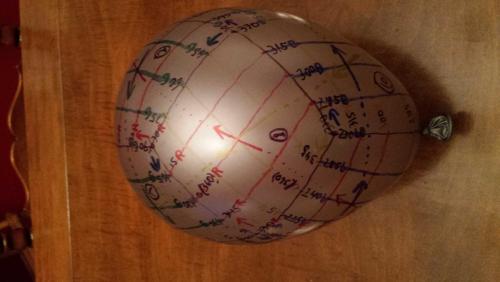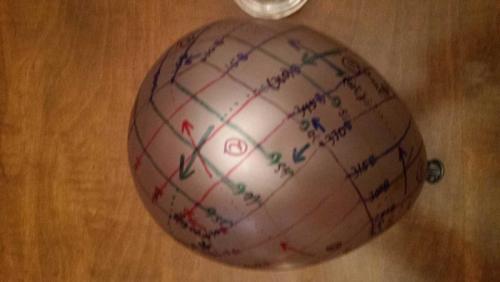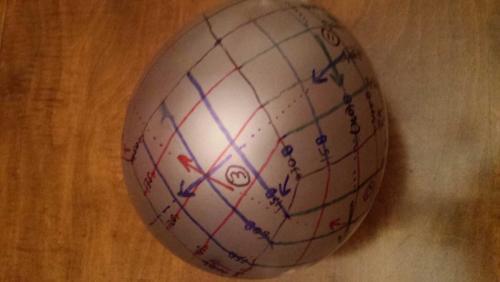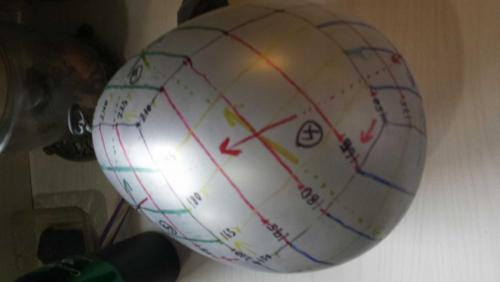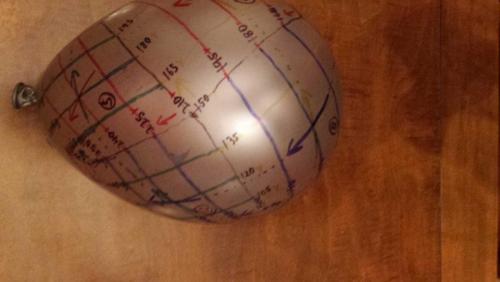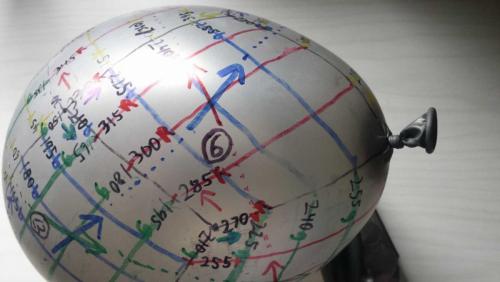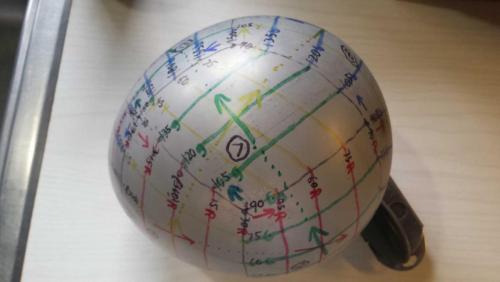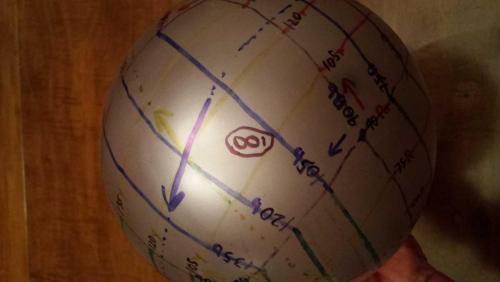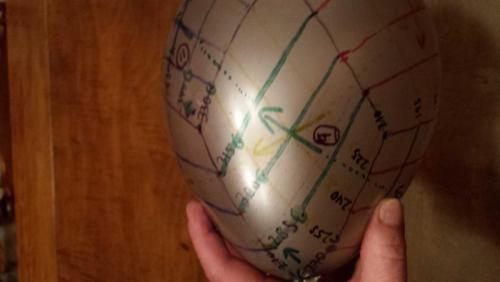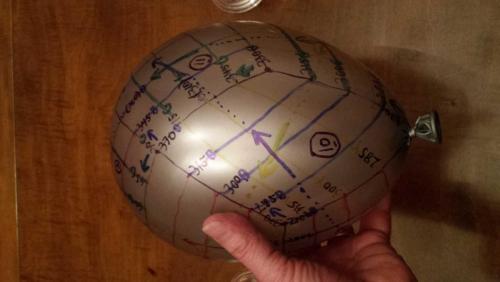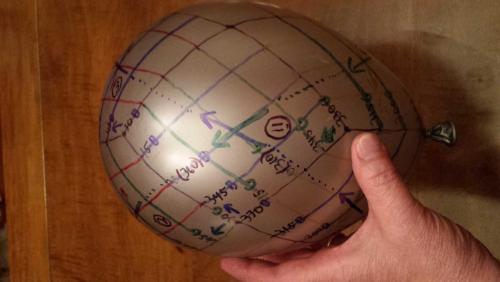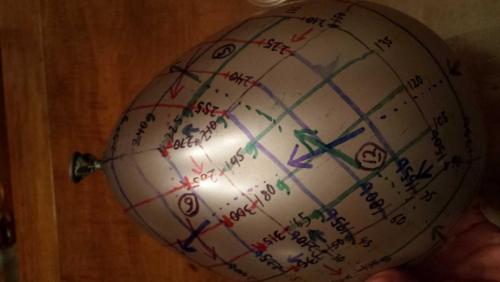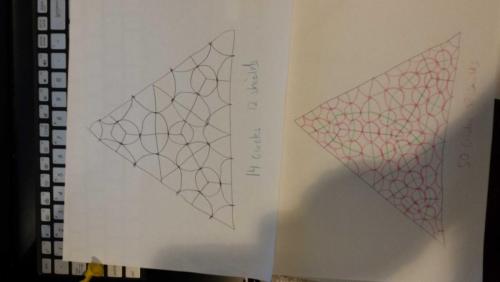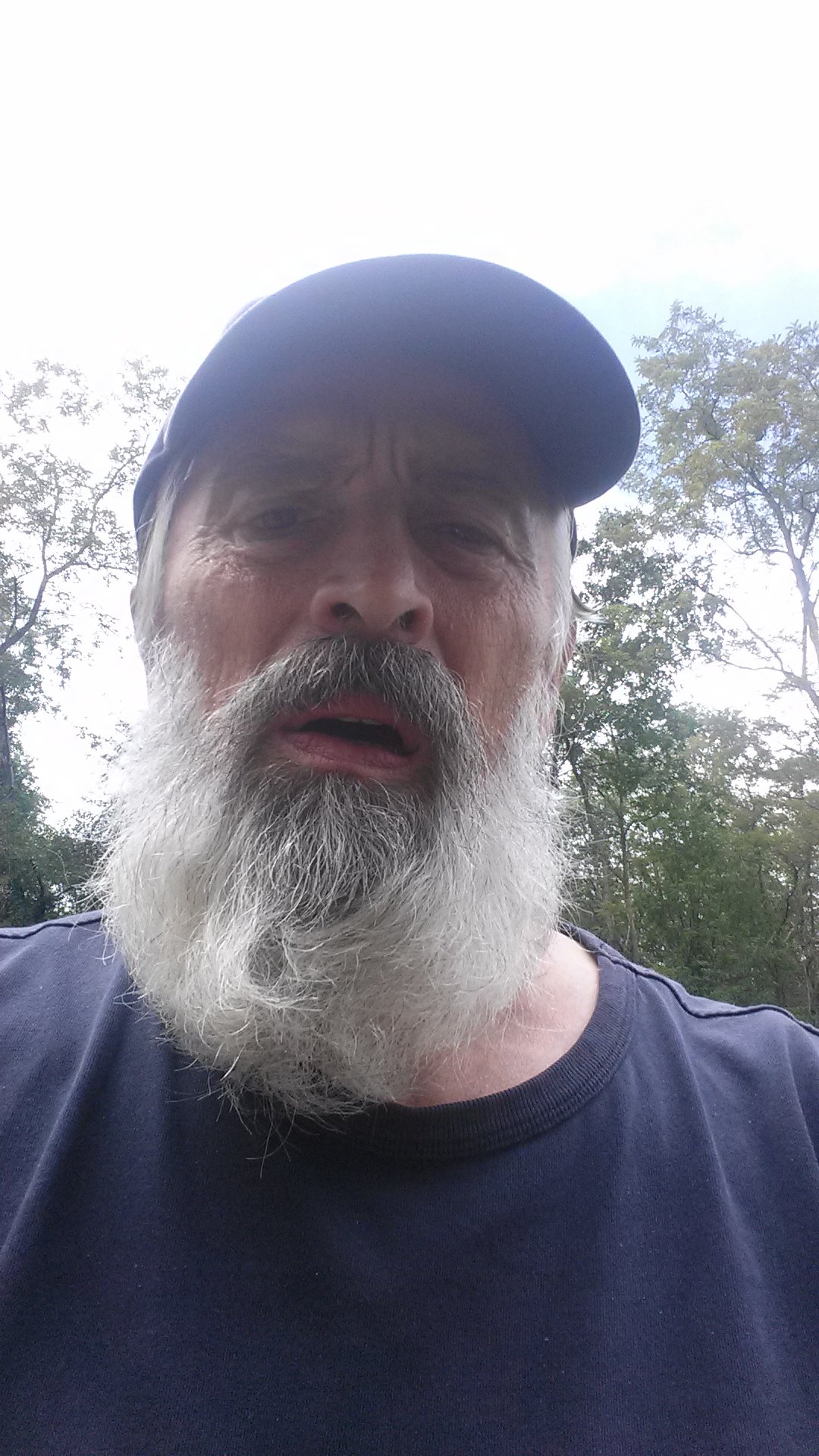
Everything posted by tar
-
Philosophy, Science & Reality
klaynos, Well yes its frustrating, but you are setting artificial limits as well. For instance you believe it is true that people sometimes hallucinate something that effects multiple senses. If you were to give me an example of this, I would believe it too. We both make a distinction between what is real, and what is going on in our model of reality that is not accurate. That is we can both discern between what is peer reviewed, waking reality, and what is due to mental breakdowns, dreams, drugs, and common beliefs. I for instance cried when the place that put my dog to sleep sent me a postcard about meeting Shady again, running across the field to greet me as I crossed the rainbow bridge. I know there is no such bridge, in reality. Regards, TAR (yet I have real tears running down my face right now) and you, Klaynos, know that there is not a rainbow bridge in reality, but you also know that I am real and I once had a real dog named shady, and that there is a vet that sends out cards about the rainbow bridge that can verify my story you know its true, because it is true in more than one way peer review is what we go to, to check we have not fooled ourself into believing what we wanted to believe but we are already pretty sure the thing is real because it satisfied all our tests and senses and we already checked that it was true in more than one way Peer review would be pointless if we did not believe that other scientists were real and could run the same checks that we ran and get the same results, because the thing we were modeling actually was out there to be tested against our model, for a match.
-
Philosophy, Science & Reality
Could but not likely it happen that way in every case of a sensed human. That is, we each have our own model of the place, and that model is by definition imaginary or illusory and prone to error and differences, but in all cases of model building, the model is of something, and according to everything I have read, everything I have heard and everything I have seen, smelled, touched, tasted, and everything you and I have conversed about, the reality that science seeks to model is real and is something that we both have in common. besides a person can not be a creation of his own mind, because he would need a real mind to be the creation of, in which case the mind in question exists
-
Philosophy, Science & Reality
Strange, Well all the proof that is required is for one person to "sense" another and for the other, at the same time to "sense" the one, and then for the two to compare models. If the "common" model has it that there is the one and there is the other and there is an entire universe common to and outside the both, then the one, the other and the rest, are real. Regards, TAR
-
Philosophy, Science & Reality
except the solipsist has the problem of determining the "real" population of reality if it is only her that is real and all else, other than she is deemed by her, to be illusion, then the total number of entities that exist in reality is one This can only be the case if such a wonderer is reality itself...in other words, it can only be the case if all that we are calling the waking world, or reality, is occurring in the mind of God and she, the solipsist, is God. I don't think this is the case, nor would it provide any discussion points, since she would already know she was alone and had no one to talk to, or any entity to run into, that was not created in her own imagination. I think it more reasonable to assume that reality exists and we each build our own model (image) of it, from what of it we sense. now it is possible that God got lonely and invented the world, and we are each just a piece of her consciousness, and it is our job to be a single point of consciousness, pretending to be separate from her, in order to witness the rest as "something else"...but in that case, I would have to say she is a great illusionist, and we might as well just play along, being that the alternative is to tell her she IS alone
-
Philosophy, Science & Reality
Perhaps something makes "sense" when it is confirmed by more than one sense. Then it is true, in more than one way. Add peer review, and you have confirmation from someone else's senses. It then is confirmed as making sense because it all fits together in the waking world, and has its own, non illusion type reality, without ANY requirement that any particular individual thinks its true. knock on wood
-
Philosophy, Science & Reality
dimreepr, but implications are important We could half the population of the world in a short amount of time, solving population and hunger issues, by returning population levels to levels half a century ago, if light eaters each killed and pickled one heavy eater, to eat during the upcoming year, if everybody completed their task this afternoon. Math is exact, but what the implications are is the REAL question. What is standing for what? Is the speed of light taken as 1? In which case, you just took reality right out of the equation. Regards, TAR
-
Philosophy, Science & Reality
Thread, Do you think there is a different relationship between science and philosophy in terms of the reality of the situation, depending on the branch of science? That is, if you are a material scientist, you are interested in stress and strain of materials and such for purposes of building a bridge that does not fall down. If you design and select your materials correctly the bridge REALLY does not fall down. The reality of your work and knowledge can be easily verified by reality...empirical feedback. "Is the bridge standing?" There is little argument over the reality of the answer. In quantum physics, you get a little more philosophy leaking into the arena, where the way you look at it, will give you different answers, and different scientists in the field can favor different models, but basically the ideas and models can be checked against reality, where an experiment can be designed and the results can either favor keeping, adjusting, or discarding the model. Still a little flakey sometimes, as the mathematical models of probability are not, by their very nature absolute, but usually results yea, nay or undetermined or partially true can find a consensus vote. But take a field like cosmology, where we are so insulated by immense space and incredibly long time periods, that the models can not be fully vetted. Here Professor Krauss can tell us what the universe must look like to a scientist 600 billion years from now...and we have absolutely no way to empirically check on the reality of his claims. Regards, TAR here I would propose that the philosophy to science ratio is directly proportional to the reality you are giving to the model That is, is the empirical checking happening on paper and computer and in the imagination against the model, or is the empirical data coming directly from reality and is it the actual, real behavior of the people, place and things that is the focus of the exploration.
-
Philosophy, Science & Reality
"Science is not interested in reality per se, but to explain the universe around us by the construction of models: If by chance one of those models hits on this "reality"or "truth" then all well and good." "To those who wish to impose their definition of reality abstractly, independent of emerging empirical knowledge and the changing questions that go with it, and call that either philosophy or theology, I would say this: Please go on talking to each other, and let the rest of us get on with the goal of learning more about nature." BeeCee, To me, the person is by definition a scientist. We internalize the entire universe, in an analogous fashion, into a model of the universe constructed with the cells and synapses, connections and signals in our brains. There is not one of us, that knows better how to do this science, than any other or every other human that is so constructed, by nature. Where Lawrence Krauss goes wrong, in my estimation, is when he thinks, or knows, that his model is superior to mine. And that goes for SwansonT as well. One can construct a special club, a regimen of thought, with the same rules and language and analogies and transformations and assumptions as the next guy or girl and call that science, but the science is already done in the noticing and model building that a human does when she walks down the street and experiences reality. That I am not privy to the meeting of professors at Oregon, does not ban me from being a scientist. And the realm of multiverses and string theory and 12 dimensional universes that could have been instead of this one, are not discussions of reality at all, but discussions of the models of reality that exist primarily in the literature and the brains of theorists. So one does not gain ownership of nature, by noticing it, any more than another person gains ownership by noticing it. Where string theory and particle physics models happen to "hit on" reality, fine and good. But it is also fine and good to match your memory of an Oak tree with the Oak tree outside, look at it, go over to it and touch it, and be assured and reassured that your model of reality, your internal model of the entire universe, is actually true. Regards, TAR
-
Philosophy, Science & Reality
SwansonT, Not sure I understand or agree or know who figures out how science should behave. Regards, TAR
-
Philosophy, Science & Reality
Thread, Forgive me for not reading through the thread, but I have a contribution to make, from only a scan through and the reading of a few posts. The human being is, from my own personal experience, and from the stories of others, a being that senses the world through sight and sound and smell and taste and feeling, including a sense of one's body and balance, that all together associates the human being to the world that he/she is in and of. Allows the human being to move through and affect the world to his or her advantage. Given this starting point, I frame the three, Philosophy, Science and Reality in the following way. Philosophy is the study of reality from the point of view of the human being. Science is the study of reality from the point of view of an objective observer, stripped of as many human fallacies, and human subjective considerations as possible. Reality is what both study. It seems to me, that truth is going to be the case, whatever humans know about it, say about it, or think about it. However, truth also seems to be noticeable from all directions. That is a true thing is usually true in more than one way. That is I am real. I am also my sister's brother. I am also the guy that lives on the corner and mows his lawn...and so on. A big thing in science is peer review. This does not eliminate human fallacies and human considerations, as a human can not actually take an other than human point of view, but it assures us that the thing actually exists in the waking world, experiencable by others. Math is interesting because it is analogies and relationships and pattern matching and grain size switching, and one thing standing for another...all very human things to do, but it provides a framework, from which two humans can explore reality together, in an exact way, taking as much subjectivity out of the situation as possible. It looks Red. or It is reflecting electromagnetic radiation of between 630 and 700 nanometer in wavelength...are both ways of talking about the same reality. Regards, TAR The math of philosophy is logic. The math of science is algebra, geometry and calculus. The math of reality is everything fits together flawlessly. Mike Smith Cosmos, Established Dogma ain't such a bad thing. It gives us a common language with which to communicate our thoughts and feelings. Dreams are nice, but they are not, per se, of the waking world. And thusly not empirically sharable, but in an imaginary way. Regards, TAR Dreams are of reality, but they do not have to fit together flawlessly. Reality ALWAYS fits together flawlessly.
-
Dividing a sphere into twelve "identical" shapes.
raw garnet shape https://www.bing.com/images/search?view=detailV2&ccid=nowVWIX1&id=C007BF16FABC5E16D6B36DCC9973301243F428EF&thid=OIP.nowVWIX1VsYoEfOxVWtUVgEsEs&q=garnet+shape&simid=608004509805773192&selectedIndex=0&ajaxhist=0 almadine Garnet https://www.bing.com/images/search?q=almandine+garnet&id=0C7E8E6902765A577EC8D82E8674F7CCD2F4DE60&FORM=IARRTH chemical composition, crystal category, etc https://en.wikipedia.org/wiki/Almandine
-
Dividing a sphere into twelve "identical" shapes.
When I use the term "three points" I just realized it could be interpreted as three points. I mean it to mean two opposite points where three diamonds touch. Here I am making a distinction between the 6 points where 4 diamonds touch, which I call four points, and the 8 points where three diamonds touch, which I call three points. Perhaps I should say threepoints, or three-points. But in any case, these 8 three points, analogous to the corners of a cube, in spacing and in the intersection of three faces of the cube in a "corner" can be thought of as 4, opposite corner pairs. Each of these pairs, if an axis is drawn through them is the axis of a color wheel.
-
Dividing a sphere into twelve "identical" shapes.
Thread, Like DrP's orange slices, each of the four color wheels division lines is part of a great circle, where they all intersect at two opposite points which happen to be the three points each at the intersection of the three diamonds on either side of the color wheel you are looking at that are not part of that color wheel. For instance, considering the red color wheel, which consists of diamonds 1,2,3,4,5, and 6, you can spin that wheel around an axis that goes through the point where diamonds 9,10 and 11 touch and the opposite point where diamonds 7,8, and 12 touch. The 16 divisions of lets say diamond 1 are created by 5 red slice lines at 15 degree intervals, 5 yellow slice lines at 15 degree intervals. In the case of diamond #1 the degree lines would be 330R, 345R, 0(360)R, 15R, and 30R, for the red wheel division lines, and 330Y, 345Y, 0(360)Y, 15Y, and 30Y for the yellow wheel division lines. The convention I suggest is to consider the "bottom" of each diamond, the direction from which the increasing degrees are coming from, suggesting that the bottom corner be the one consistent with the base of both arrows depicting the direction of increasing degrees running around the sphere from 0(360) around to that same point in the center of diamond 1 for the red and yellow wheels, and the center of diamond 11 for the blue and green wheels. As a picture is worth a thousand words, I drew a silver balloon out, with the 15 degree divisions and the arrows showing the direction of increasing degrees. Also, by convention, I am suggesting that a particular division size be stated for the consideration of the entire sphere, and that the midpoint of a designated division be considered the "direction" of that designated division described by the coordinates of the bottom corner of that division. Regards, TAR
-
Dividing a sphere into twelve "identical" shapes.
missed an 8 4 times pi divided by 43,200 is 2.908882086657215961539615394846141477e-4 Also I would like to note that the angles around the outside of the diagram in #162 are for figuring purposes only and are as if the diamond is extended. On the actual sphere the borders would involve being next to diamonds whose division lines would wind up coming in in a mirror image angle manner. That is the middle intersection would not read 105\75\105\75 it would show as 105\75\75\105. And the 60 degree angles at the 120 corner are there as well for figuring purposes, as the 120 corner is actually a three point, as in 120/120/120, not the 120/60/120/60 shown for smooth progression from 60 to 90 degrees in 7.5 degree increments.
-
Dividing a sphere into twelve "identical" shapes.
Thread, I have finally proven to myself that the divisions of the diamond, are of equal area, hence volume, hence can be divided into finer and finer measure, as desired, and my system can be used to denote, any particular area or any particular direction, given a sphere of defined radius, with a north pole and a point on the equator being the center of diamond #1. The four wheels, red, yellow, blue and green each 360 degrees, allow for the definition of the bottom corner of an area of whatever fineness you need. Using the chart and diagram in post #162 and this calculator (named rechner, meaning one who calculates, on a german site) https://rechneronline.de/pi/spherical-triangle.php you can find half the excess and area of the sections to be 1.875 and .0327249235 to 10 digits respectively in the example of 16 sections per diamond (15 degree divisions) you multiply these numbers by 32 and then 12 and you get 720 and 4 times pi respectively the eight sections on the diagonals can be figured directly by bisecting the non duplicated angles the other 8 cannot be done in this fashion but can be figured by figuring a quadrant subtracting the two known areas, and dividing the remainder in half (bisecting the angles with a plane does not go through the center of the sphere with these eight) it works with a diamond, and with a quartered diamond and with this example of the 1/16 of a diamond area I postulate that any degree by degree division will work out to be of equal area, even the shield shaped sections up against the 120 angle corners of the diamond. Regards, TAR for instance the excess of a diamond degree would be 720 divided by the number of diamond degrees which is already established as 60x60x12 or 43,200. or an excess of 0.01666666666666666666666666667 per TAR diamond degree or an area of 2.908820866572159615394846141477e-4 given a sphere with the radius of 1 (thank you Leonhard Euler)
-
Sharia in the US
CharonY, The Muslim religion did not go through the reforms and protests that the Christian religion did. There have been many years of adjustment for most religions to become more compatible with secular governments. Kings are on their way out, or have diminished roles all over. There are not that many religions that claim total say over a follower, legal, political, cultural and religious.. It is possible, as you have shown for Muslims to have a wide range of adherence to, and deviation from the rules. But mostly when they live in a non-muslim country that has a secular government. There are indeed different sects like the Shiite and the Sunni that might hold different beliefs, or certain countries where Muslims are allowed to be more liberal and break the rules. Or black Muslims in America that have their own set of rules, what is carried forward from Mohammed and what is more recently constructed. This is why I would like to hear from a "liberal" Muslim. Which of the old crap laws have you dropped and what are your new standards? The old crap laws don't work here in the U.S. and we will never allow ourselves to have territory within our borders, that answer to a Caliph and not the local, state and federal government, in terms of solving legal and family disputes and determining human rights and freedoms. But no, I can't particularly say why it is OK for a thing to be the case where we use to do another. . When I was young there was a manger scene every year in the home plate cage at the park across the street. Public park. Somewhere in the last 60 years we figured that was against the constitution. I personally don't think it un-American to display such things. Still allowed, but only if other people with different beliefs get equal time in the public spot. Gets silly to have big signs that say "there is no god" and such, to give atheists equal time. I AM an atheist and I think its rude and inappropriate. And it feels wrong, and causes friction between believers of different things. So no, I can't tell you why one religious tradition is valued by a society and another rejected. Maybe it comes down to the context you are talking about. If you have a town, where there is one person that would be offended if public places displayed a nativity scene then such should not be done...but if everybody in town wants the nativity scene then a government ban from the Federal level, would be an imposition. Regard, TAR
-
Sharia in the US
SwansonT, ' Well if our upholding of the constitution demands we protect people's rights to practice their religion, up to the point that it infringes on other people's rights, or breaks the laws of the land, then the question is at what point does the practicing of Sharia law break our laws? Should we ever protect a Muslim's right to construct a tower and call other Muslim's to prayer, in a loud fashion? Can a bank refuse to hire a Muslim, because a practicing Muslim denounces the charging of interest? Should a public school make special allowances so Muslim children can pray? Should beards and clothing required by the religion be worn by Muslims in situations where such are inappropriate, or not customary? At what point does the teaching of Islam, in a Mosque, become radicalizing? Should we monitor Mosques to ensure they do not present a danger to our way of life? If, when a Muslim is in a Mosque in Racca, practicing their religion the U.S. is the great Satan, smoking,looking at pornography, worshipping graven images, taking drugs, having anal sex, charging interest, making mischief across the globe, siding with the Zionists, giving Allah associates and worthy of having their heads cut off for their crimes against Allah, what aspects of this can I assume are being similarly taught in the Mosque down the street in good old U.S.A.where a Muslim is practicing their religion? What, about being a citizen of the U.S. do Muslims like? What are they teaching their youth? After 9/11 I read the Quran twice. Once for the jist and once for comprehension. I wanted to know, why a person would think it advantageous to their religion, to fly planes full of people into buildings full of people, in my country. My book report on the Quran and my assessment of the religion that memorizes and recites it, is this. Muhammed got messages from Gabriel an angel of Allah, retelling the stories of the Old and New Testament and setting new rules, in the dark of a cave. He related these messages from Gabriel to his scribes who wrote them down reflected in the first parts of the Kuran. The ideas are Muhammed's and the reasoning is Muhammed's. He structured his thoughts to convince his followers that doing his will, was doing Allah's will and vice a versa, and simultaneously oft repeated that he was but a simple prophet. He basically repeated all the stories of the bible, but made a few corrections, pointing out where jews got it wrong (charging interest) where Christians got it wrong (the father, son and holy ghost) and where idol worshipper had it wrong, to worship, graven images. The most part was to set rules for what one not do, like eat animals found on the road, that you did not kill, and what to doh with your wifes and such in terms of punishing them at the appropriate time for their sins against Allah or the prophet, and when to fight against someone, and when to show them mercy and such. How you will get satin couches and virgins and rivers of honey for following the prophet, and have boiling oil poured down your throat for eternity for mocking the prophet. The last part of the Quran sounds more like the Scribes just repeating earlier ideas of Muhammed, like he ran out of ideas and the scribes just repeated stuff and wrote poetry praising Allah and the prophet. But the religion was founded to make Muhammed the caliph and bind together the warring idol worshipping tribes, in a fight for dominance of Arabia and the Middle East. Political in nature. The religion is both spiritual and political. The division between the believers and unbelievers is repeated over and over in many different ways throughout the Quran. My question remains, how do you recite the verses over and over, every day, and not believe them? How is practicing a religion, meant to bind the troops behind a conquering caliph 800 years ago, going to find itself compatible with my way of life, here in America in 2016? Regards, TAR so...if a Muslim man, would physically strike his daughter, for wearing makeup, would our laws protect the man's right to practice his religion, or would we interfere, on the basis that we think it alright to wear makeup and not OK to punish someone for doing it? does our government have the right to tell a parent how and when to discipline their child, to ensure their compliance with the rules of the religion they practice?
-
Sharia in the US
DrP, You guys, is talking about all of us. We had a situation a little while ago where ranchers were protecting their land from government takeover for a bird sanctuary. If public good and eminent domain is good for birds, then it is good for gas lines. We stole the land from the Indians. Fact. We made treaties with the Indians we should honor. We should respect their sacred sights. We had a gas line put in across North Jersey, that a lot of land owners and towns protested. It went in anyway. For the public good. Regards, TAR Well fine, be a Muslim that does not adopt Sharia law, if that is possible then fine. But is that possible? I know I can be Christianish without believing in God. Can a Muslim be Muslimish without believing in the teachings of Muhammed? I don't think it works. Can they believe in the constitution of the US AND Islam, is the question. Regards, TAR I would like to hear from a Muslim on this. Is it possible? Can you recite the words of Muhammed and his scribes, 5 times a day, AND accept the constitution of the US?
-
Sharia in the US
CharonY, One argument would be that we are predominately a Judeo/Christian country. The laws of Moses and the Laws of Jesus are entwined in our laws. The attorney general of the U.S. spoke of love being an important consideration. Love trumps hate, is a placard in the current street protests. Obama is pardoning drug offenders that were jailed when crack cocaine sentences were longer than cocaine sentences, he talks of forgiveness and second chances and repentance. My father is a retired psychologist and professor, he did not come to church when our mother took her daughter (my sister), and I. But his father took him to church. His father gave him his values, how one should be toward others, and it included all the teachings I learned from Sunday School and all the things my mother taught me about Jesus' love. My sister and I are both atheists, my father is atheist, my departed mother was Christian, through and through. My wife who is religious, took my daughters to Episcopal church, because we wanted to teach them the values associated with the religion. We were married in an Episcopal church, baptized our daughter there and live according to Christian principles of love and tolerance, respect for others and personal responsibility to do the right thing. When you walk down the street in the U.S. you know that the people around you believe in both the constitution and their religion. The two are compatable here, because the founders of the constitution were going by Christian values, that accepted people of other faiths. The separation of church and state works here, because both Jews and Christians can handle that separation. American Muslims can handle that separation, because they have seen the value of the constitution's separation of church and state, and of the Christian values of love and tolerance and the combination of workable religious values, with workable human laws, based on religious values, makes a workable framework, for all. Islam is compatible with Christianity and with Judaism because all three are based on Moses laws. Basic tenants of all the religions are similar, but Muhammed made some adjustment to the old testament, that talked about Christians being in error because they believed erroneously in Allah having associates, and Jews being in error because they charged interest on loaned money, and idol worshippers being in error because they worshiped graven images, and people that mocked Mohammed being in error, because mocking the prophet of Allah was mocking Allah. My father did not reject the teachings of his father, but did not go to church. I do not go to church. My daughters no longer go to church, but my one daughter believes in god and the other not so much. My sister and her husband and their son do not go to church, but everybody in my family is a good person, and tolerant of others and forgiving of others. I do not see those qualities in ISIS. The difference between the beliefs of ISIS and my beliefs and the beliefs of my children are the tenants of Christianity and the tenants of the constitution of the U.S. Regards, TAR
-
Sharia in the US
I am not an expert on sharia law, but I understand it is the political half of Islam. Muhammed, as first Caliph of Islam decided all things legal and political. He was not just a spiritual leader, and a prophet of Allah. Muslims must learn the Quran by heart and travel to Mecca and circle the stone reciting such, as least once in their life. They must strive to live their lives as Muhammed did, and fight the disbelievers in Muhammed and Allah. ISIS has a Caliph and the main idea of ISIS is to establish a caliphate, initially around Raqqa in Syria, but including lands in Iraq. They have eyes on Libya and other locations around the Mediterranean. I saw a picture of the expected near term caliphate about three years ago, that had black pretty much surrounding the south and east of the sea. This was not religious in essence it was political. Sharia law would be the law of this caliphate, hence a law I do not want to see in my country. It is not compatible with our laws. Not the way it treats woman, not the way it treats gays, not the way it feels toward interest or Christians or Jews or apostates or idol worshippers or people that would mock Allah or Muhammed. It would not work here, it is not desirable here, and anyone bringing it here is not welcome here. That is, I will not accept a tower with a speaker calling me to prayer 5 times a day. It is not our way. What is left of Islam, if you take away sharia law? Not much. It is basically then just the old testament. Regards, TAR
-
The Official Poetry Section
To be in error we fear. The righteous we endear. Aligned with truth and beauty we endure, against the horrible and impure. The world waits for our enlightenment... Or do we wait, to be enlightened by her?
-
Political Humor
I sometimes confuse alt republicans and neo conservatives, by using big words.
-
Dividing a sphere into twelve "identical" shapes.
DrP, There are symetries and dual figure relationships I am exploring that are very satisfying to me. More than orange slices. I have always struggled mightily with the sphere, and its geometry and am looking for a system that deals more in whole numbers and fractions, than approximations, to label the positions on the sphere, and the area and volume as well. I could not divide the orange slice smaller and smaller in such a regular fashion as I can the twelve diamond sections. Regards, TAR
-
Dividing a sphere into twelve "identical" shapes.
Thread, Still trying to determine if the area between the circles is of equal area in each division. On the way I have applied the circles, or ovals to the triangle sphere I developed earlier, with the shield shapes that show themselves when you divide a tetrahedron into the twelve sections. So it is like the four sides of the tetrahedron unfolded and laid flat to give a two dimensional view of a sphere, looking at all sections at once. This to show the "plus two" nature of the sphere and its divisions when you compare the number of circles on the intersections of the divisions with the number of divisions. Here, the three points of the diamond make up one circle, the sides, since folded over have half circles on them, and the center half circle on each side is actually a full circle, since the center of each side represents a point of the tetrahedron where the circle is around a three point, like at the points of the large triangle. Here you can see how the sphere comes around on itself and will have two more circles on the division intersections, then it does have divisions. Regards, TAR
-
Dividing a sphere into twelve "identical" shapes.
(just noticed the smiley face on the medium size division paper and wanted to let you know it has nothing to do with the scheme. I was in the hospital getting a knee replaced and have to inject a blood thinner into my stomach in a little smiley face pattern two inches from my belly button, and that little drawing is a picture of where to place the injections.)
